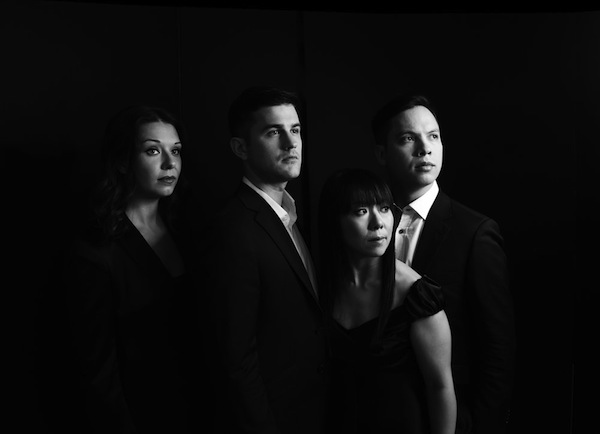Attacca Quartet plumbs dark side of history at Rockport Festival
As a boy in the 1940s, Steve Reich frequently traveled by train from New York to Los Angeles, splitting his time between his divorced parents. Later in life, he realized how different his journeys would have been had he been living in Europe during the same time. As a Jew, Reich surely would have been sent to Auschwitz or other concentration camps to face a grisly death.
In 1988, Reich poured his experiences and those of Holocaust survivors into one of his most remarkable compositions, Different Trains. By weaving snippets of recorded interviews into the dense musical fabric of both a live and recorded string quartet, Reich etched in music a poignant monument of historical memory.
Friday night at the Shalin Liu Performance Center, as part of the Rockport Chamber Music Festival, this memorial to victims of Nazism spoke with new vigor through a performance by the Attacca String Quartet and an accompanying film by Beatriz Caravaggio.
Though Different Trains is a multimedia experience, Reich’s original conception didn’t include film. He envisioned it as a hybrid concert piece and documentary—a concept he called a docu-opera in his notes to the printed score—but he only included video in The Cave and Three Tales, later works of similar technique and narrative style.
Caravaggio’s film is a worthy successor to Beryl Korot’s video imagery on those projects. Using black-and-white footage, Caravaggio matches Reich’s minimalist technique with images of rushing trains and sweeping countryside. In the second movement, Europe—During the War, Caravaggio shows disturbing clips of people being herded like cattle onto train cars. The images, along with Reich’s recorded texts (which are also cleverly placed on screen), slowly reveal the prisoners’ fate.
The music threads together Reich’s splintered narrative, and throughout, the Attacca Quartet rendered the evocative score with energy and commitment. The ensemble played with silver-toned intensity. Violinists Amy Schroeder and Keiko Tokunaga traded chugging figures and whistle-like harmonies with cellist Andrew Yee and violist Nathan Schram, who wove Reich’s melodic fragments into a texture that buzzed, churned, and propelled ever forward.
Framing Different Trains were two works by Arvo Pärt for violin and piano that provided a sense of solace.
Pärt’s unique contemporary minimalism resulted from his interest in chant. His Fratres, heard Friday, unfolds in a repeated and revolving set of chord progressions, played searchingly by pianist Stephen Prutsman. Violinist Danny Koo answered with simple chains of notes, driving figures, sweeping triplets, and glassy harmonics that sometimes evaporated into scratchy sonorities.
Spiegel im Spiegel, one of the earliest examples of Pärt’s tintinnabular style, flowed in soft phrases. Koo arched a slow-moving line over Prutsman’s bell-like figures in the piano, the duo’s performance supplying a reverential companion to Reich’s music.
The concert opened with another testament to the effects of authoritarian fear: Shostakovich’s String Quartet No. 3 in F major. Written at the end of World War 2, the Third String Quartet captures the composer’s troubled inner life under Joseph Stalin’s ever tightening grip on the Soviet public.
Spanning five movements, the quartet is at once playful and sarcastic. The composer initially penned descriptive titles to the movements, but prior to the premiere he removed them for unknown reasons.
The Attacca Quartet were in synch with all of Shostakovich’s darkness and combustible drama. The first movement bounded with Haydnesque wit. Without taking the exposition repeat, the quartet dug into the development, the music coursing with energy without becoming overbearing. The musicians brought a rough edge of tone to the second movement and ferocious Scherzo as the Bartókian harmonies fell like hammer strokes.
The heart of this quartet is the fourth movement, and Shostakovich’s mournful lines—an homage to unnamed dead—flowered with aching beauty. In the final movement, the Attacca Quartet returned to the buoyant feel of the opening. The March central to the movement took on sly humor and intimacy, a breezy and quizzical conclusion to this death-haunted music.
The Rockport Chamber Music Festival will feature pianist Stephen Prutsman in music of Bach, Debussy, Schoenberg and others 8 p.m. Saturday at the Shalin Liu Performance Center. rockportmusic.org; 978-546-7391.
Posted in Performances




